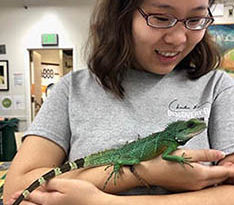Editor’s note: This is the 2nd in a series of posts by environmental reporting students on things they learned at the recent Society of Environmental Journalists conference.
By Yue Jiang

Yue Jiang
I was born in Beijing, a city that is surrounded by mountains on three sides and is a bit far from the ocean. I never saw an ocean until I was 11 years old. At that time, I visited the sea as a tourist or more like a spectator.
Neither do I live near the ocean, so why should I care about it? Those questions popped up when I was in geography class in my middle school.
One of our mandatory homework assignments was to recite and repeat the names of the seven oceans in the world. I didn’t know why they required me to do it, but I was glad to get points on my quiz. I used to think that the seven oceans stood for grades in my exam.
However, one thing changed my mind forever. I visited one of my friends whose campus was near the sea, which is famous for angling and birdwatching. My friend and I saw an aquatic diving bird at its last gasp with fishing line wrapped around its wings. We couldn’t save it, even if we cut the fishing line and called the conservation center.
The moment you watch life passing is always a turning point to think about something. I was afraid that the sea could be full of fishing line, which is a nightmare for most marine organisms.
Where does fishing line come from? From humans. Who leaves it in the sea? Humans. In my mind, the human impact on oceans is negative all the time.
With the severity of global warming, high sea levels have become a prevalent issue. I feel like more and more media intend to consider the ocean as victim and the human as inflictor.
 In a workshop “Oceans, Coasts and the 2020 Election” at the recent Society of Environmental Journalists online conference, Oregon State University professor Jane Lubchenco, a world-renowned environmental scientist, referred to a dominant narrative that oceans are now higher, warmer and more acidic. With less oxygen, they also are less productive and less predictable, based on the 2019 The Intergovernmental Panel on Climate Change Special Report on the Ocean and Cryosphere in a Changing Climate. Those stories and articles are strong evidence to prove my prejudice. I became radical and polarized.
In a workshop “Oceans, Coasts and the 2020 Election” at the recent Society of Environmental Journalists online conference, Oregon State University professor Jane Lubchenco, a world-renowned environmental scientist, referred to a dominant narrative that oceans are now higher, warmer and more acidic. With less oxygen, they also are less productive and less predictable, based on the 2019 The Intergovernmental Panel on Climate Change Special Report on the Ocean and Cryosphere in a Changing Climate. Those stories and articles are strong evidence to prove my prejudice. I became radical and polarized.
I did not mean those articles are bad or fake because they do portray the real world.
What I mean is that as an environmental journalism student, or even if you are already an environmental journalist, shouldn’t fall into the echo chamber trap. Whether you are positivistic, interpretive or critical journalists, doing more research and attending science conferences are helpful because our world is dynamic.
There is one source you could use when covering oceans: the High Level Panel for Sustainable Ocean Economy, where you can read related science papers in the Blue Papers section.
Watching the SEJ conference talking about the ocean, I have a new perspective from Lubchenco, which lets me jump out my cliché. She emphasized there is one ocean — all connected. If you separate the ocean into seven parts, as I learned from my middle school, you may think they are not related.
She also listed what dominates news now are top global issues including health, economy, politics, fires, technology, inequality, COVID-19, environmental issues and the ocean as a victim.
She said there is a new way of thinking: from ocean as victim to ocean as a solution. This is a good perspective to write environmental news stories. Ocean or more broadly, environment is no longer a victim but a solution to solve negative impacts.
Lubchenco gives three scalable solutions which could be our potential directions: climate mitigation, food from the sea and economic recovery from Covid-19.
I take the second one, food from the sea as an example. According to Michigan Sea Grant, the Great Lakes are connected through a system of channels and connecting waterways, such as the Detroit River and Lake St. Clair. These enable water to flow from Lake Superior all the way to the St. Lawrence Seaway and the Atlantic Ocean.
Therefore, we are part of the ocean.
On this point, I would like to emphasize how a geographical map can help you find a story—finding relationships among each other. Commercial fishing played an important role in the settlement of the Great Lakes region but commercial fishing is sinking fast in Michigan.
Lubchenco said fishery reform helped rebuild stocks, and non-fed aquaculture like mussels and crabs will be prominent in the future.
Will these things happen in Michigan? Will non-fed aquaculture affect the traditional fishery industry in Michigan? Based on the new perspective, we could look for how the traditional fishery industry could benefit from it.
Another example is a story about the lionfish invasive species. The story focuses on how they can be tasty cuisine on the table instead of a terrifying invader for native species.
Yue Jiang is a master’s student in the Knight Center’s Environmental Journalism class.
